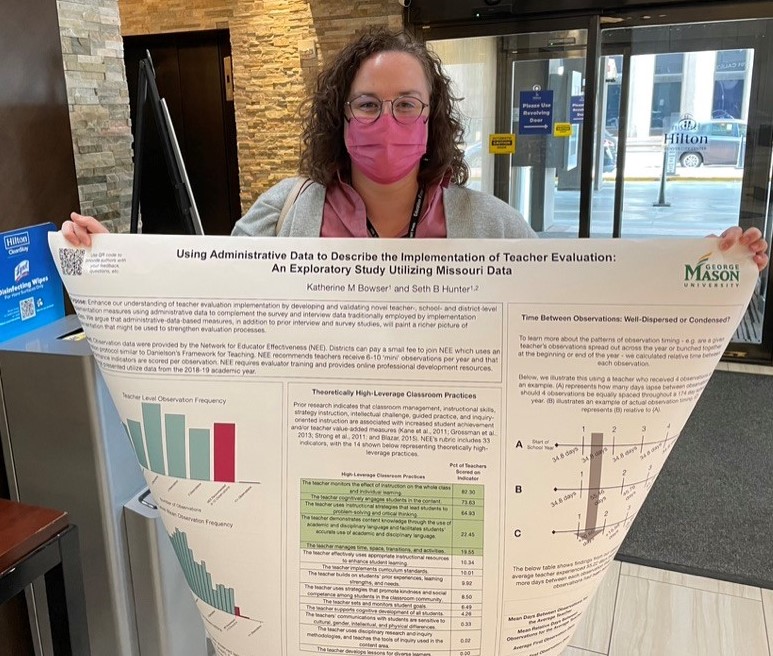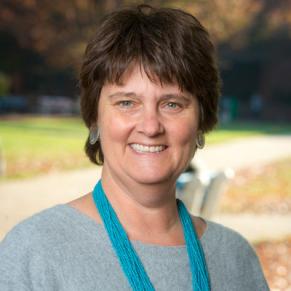PhD in Education with a Specialization in Education Policy
Upcoming Infosession
- 2/3/2026: PhD Education Programs Virtual Information Session — Virtual — 5:00pm - 6:30pm
- 3/18/2026: PhD Education Programs Virtual Information Session — Virtual — 5:00pm - 6:30pm
- 4/7/2026: PhD Education Programs Virtual Information Session — Virtual — 5:00pm - 6:30pm
- 5/7/2026: PhD Education Programs Virtual Information Session — Virtual — 5:00pm - 6:30pm
The PhD in Education Program is individualized, interdisciplinary, and experiential. Students may opt to specialize in education policy (EDPO) or incorporate coursework within a self-defined interdisciplinary program of study.
Have questions? Attend an information session or contact the specialization representative, David Houston.
About the Specialization
The Education Policy Specialization involves the study of education policy and how it helps individuals understand how decisions are made at various levels of government, how decision-makers use educational research and evidence, and how to influence the decision-making process. The program encourages students to hone skills that are needed for sound policy research and analysis.
This specialization allows for flexible academic planning and research according to participants' interests, career goals, and learning format. With the advisor's approval, students may add courses in education law or education finance, as well as policy courses in other academic units, to round out their program of study.
What Will You Learn?
The specialization features coursework and applied internships that enable you to learn:
- How to be a sophisticated and discerning consumer of education policy research
- How to conduct rigorous empirical research on education policies and practices
- How to communicate research findings to a broad array of audiences
What Our Students Are Saying
"I have had so many opportunities to work with faculty members both on their research, from data collection to writing manuscripts, and on my own research, receiving one-on-one support to build tailored research skills unique to my own interests and needs. The support and mentorship that I have received from faculty has been unbelievable and I think it is unique to Mason. I know that when I leave Mason, I will have the research skills and tools to be competitive for top positions in the field."~ Beth Davis, current student
"During my time at Mason, I have been able to customize my plan of study and work with faculty on select research projects in order to build the knowledge and skillset needed to meet my career goals. I have conducted rigorous data analyses, worked closely with practitioners, and presented my own research at national conferences. The experiences I have been a part of and the network I have been able to build are incredible. Because of Mason, I know I will be a competitive job market candidate."~ Katherine Bowser, current student
Our Graduates
Jeremy Redford, PhD 2022
- Dissertation Title: A “Process that Never Ends”: Parents’ Experiences Navigating a Public Preschool Lottery
- Dissertation Chair: Dr. Colleen Vesely
Megan Sims-fujita, PhD 2021
- Dissertation Title: Factors Influencing College Decision-Making among Students with Disabilities: A Mixed-Methods Study
- Dissertation Chair: Dr. Grace Francis & Dr. Jodi Duke
- Employment on Graduation: social work org. ; Adjunct Professor, George Washington University
Robert Graham, PhD 2020
- Dissertation Title: Mic’d Up: A Critical Narrative Inquiry Into African American Males, School Counselors & the First-Year Experience at a PWI
- Dissertation Chair: Dr. Jenice View
Andrea Guiden, PhD 2020
- Dissertation Title: In Search of 'the Right Type': An Historical Examination of Black Teachers and Quality in the District of Columbia Public Schools, 1952-1964
- Dissertation Chair: Dr. Jenice View & Dr. Diana D’Amico
Kathleen Kraus-Zadrozny, PhD 2020
- Dissertation Title: The Choice and Implication of Student Achievement Goals in Virginia Assistant Principal Performance Evaluation Policy
- Dissertation Chair: Dr. Nancy Holincheck
William Rodick, PhD 2020
- Dissertation Title: Parallel Societies: A Community School in the Context of Gentrification
- Dissertation Chair: Colleen Vesely
Brenda Calderon, PhD 2019
- Dissertation Title: English Learner Accountability in ESSA State Plans: A Multicase Policy Study of Implementation in Four States
- Dissertation Chair: Dr. Mark Ginsberg
Kristofer Pachla, PhD 2019
- Dissertation Title: Early Career Professional Development: A Multiple Case-study Examining Differences in Outcomes and Experiences in a Secondary Science Methods Course
- Dissertation Chair: Dr. Roberto Pamas
Amy Boehl, PhD 2018
- Dissertation Title: What Decisions Do Teachers Make in the Absence of Policy? A Qualitative Study of Test Retakes at the Classroom Level
- Dissertation Chair: Dr. Penelope Earley
Levi Brown, PhD 2018
- Dissertation Title: Observations of Selected Virginia Teachers on the Impact of a Value-Added Evaluation System
- Dissertation Chair: Dr. Penelope Earley
Lindsey Burke, PhD 2018
- Dissertation Title: Principal Perspectives on School Participation and Non-Participation in the D.C. Opportunity Scholarship Program: An Institutional Theory Analysis
- Dissertation Chair: Dr. Meagan Call-Cummings & Dr. Rodney Hopson
Cathleen Cogdill, PhD 2018
- Dissertation Title: Funding Virginia Community Colleges During a Recessionary Period: Impact of Utilizing an Outcomes-based Funding Model
- Dissertation Chair: Nance Lucas
Heather Keenan, PhD 2018
- Dissertation Title: Teachers Making Sense of English Learner Education Policy: A Qualitative Case Study
- Dissertation Chair: Dr. Penelope Earley
Jamila Jones Kennedy, PhD 2018
- Dissertation Title: Social Capital and Parent Engagement in Black and White Middle-Class Families
- Dissertation Chair: Dr. Penelope Earley
Ave Luke-Simpson, PhD 2018
- Dissertation Title: Realidades Rurales: A Study of the Implementation of Title III of NCLB in a Rural Elementary School
- Dissertation Chair: Dr. Penelope Earley
Jennifer Mursaloglu, PhD 2018
- Dissertation Title: Parental Engagement beyond School Walls: A Qualitative Case Study of African American Parental Engagement during High School
- Dissertation Chair: Dr. Penelope Earley
Beth Aronstamm Young, PhD 2018
- Dissertation Title: District Data Personnel Perspectives on the Federal Data Collection and Reporting Process and How They Inform Their Work
- Dissertation Chair: Dr. Penelope Earley
Details
The mission of the PhD in Education Program is to empower scholars and leaders to think critically, advance research-informed practice, address pressing challenges, and promote equity through excellence in research, teaching, and service in their chosen fields.
Each student in the PhD in Education Program is mentored by faculty in the development of their own personalized program of study that fosters their ability to:
- Demonstrate knowledge of significant theories, developments, and practices in one's chosen area of study
- Understand, utilize, and interpret basic principles, ethical practice, and methodologies of educational research design and data analysis
- Effectively communicate both orally and in writing to a variety of professional audiences
Supported professional experiences and internships beyond required coursework support mastery of these competencies, including:
- Attending and/or presenting your scholarly work at professional conferences to researchers, policymakers, and practitioners
- University teaching and/or co-teaching experiences in professional areas of expertise
- Supervising pre-service teachers
- Writing, editing, and reviewing for scholarly journals
- Research apprenticeships and assistantships
- Supported independent research in an area of professional interest
- Internships unique to the individual’s area of study
- Building a professional portfolio
The PhD in Education is awarded after the successful completion of:
- Coursework
- A comprehensive portfolio assessment
- A written dissertation
- An oral dissertation defense
Why This Program?
Are you ready to expand your impact in the field of education?
A PhD in Education from George Mason can help you reach that goal! Our accomplished faculty can help you leverage your existing expertise in the field of education and deepen your toolkit of professional knowledge and skills that will take your career to the next level of influence.
Our graduates have attained consequential professional positions such as:
- Academic faculty at post-secondary institutions
- Leadership and research positions in federal and state government, post-secondary institutions, research organizations, and non-government agencies
- Analysts and consultants with private companies, political advocacy groups, education or research think tanks, and professional associations
- School, district, and statewide leadership positions in major preK-12 school districts, technical assistance centers, and other informal educational agencies
- Curriculum and instructional materials developers
Our flexible student-centered program structure allows each student to design a personalized, interdisciplinary program of study that helps them to become outstanding educational researchers, practitioners, and leaders in their respective fields. Our faculty have strengths in:
Theoretical & Applied Research
- Choose from a wide range of advanced quantitative and qualitative research methods coursework options
- Have the opportunity to gain research experience on projects funded by federal agencies, including the Institute for Education Sciences and the National Science Foundation
Advanced Teacher Preparation
- Choose from a wide range of teaching and teacher preparation coursework and internship options, including opportunities to co-teach university courses with faculty and supervise teacher internships
- Receive advanced training in online teaching and learning
Education Leadership & Policy
- Choose from a wide range of coursework and internship opportunities in leadership and policy fields, both national and international
- Have unique opportunities for experiential learning due to proximity to Washington DC and several of the largest school systems in the country
Movement & Sport Sciences
- Choose an intensive Kinesiology program with opportunities for experiential learning in state-of-the-art movement labs.
- Or, create a custom program of study in fields related to movement and sport sciences, including teaching in physical education and sport management
How Can I Learn More?
Visit our Frequently Asked Questions and Answer Page
Attend an Information Session
The PhD in Education Program periodically conducts information sessions to acquaint applicants with our program and the admissions process. Information sessions include an overview of the PhD in Education Program followed by breakout sessions with faculty who can answer questions about professional specialization areas. Scheduled sessions are listed at the top of this page.
Foundational Knowledge (3 credits)
- EDUC 800: Ways of Knowing (3 credits) OR EFHP 860: Critical Perspectives in Exercise, Fitness, and Health Promotion (3 credits) (Kinesiology only)
Foundational Research Methods (9 credits)
Advanced Research Methods (6 credits minimum)
- EDRS 814: Anti-Colonial Methodologies (3 credits)
- EDRS 818: Critical Discourse Analysis in Education Research (3 credits)
- EDRS 820: Evaluation Methods for Educational Programs and Curricula (3 credits)
- EDRS 821: Advanced Applications of Quantitative Methods (3 credits)
- EDRS 822: Advanced Applications of Qualitative Methods (3 credits)
- EDRS 823: Advanced Research Methods in Single Subject/Case Design (3 credits)
- EDRS 824: Mixed Methods Research: Integrating Qualitative and Quantitative Approaches (3 credits)
- EDRS 825: Advanced Research Methods in Self-Study of Professional Practice (3 credits)
- EDRS 826: Qualitative Case Study Methods (3 credits)
- EDRS 827: Introduction to Measurement and Survey Development (3 credits)
- EDRS 828: Item Response Theory (3 credits)
- EDRS 829: Bayesian Methods (3 credits)
- EDRS 830: Hierarchical Linear Modeling (3 credits)
- EDRS 831: Structural Equation Modeling (3 credits)
- EDRS 832: Document Analysis and Archival Research (3 credits)
- EDRS 833: Participatory Action Research (3 credits)
- EDRS 836: Narrative Inquiry (3 credits)
- EDRS 850: Grounded Theory (3 credits)
- EDRS 897: Special Topics in Research Methods (3 credits)
- WMST 890: Advanced Topics in Feminist Research and Scholarship (1 credit)*
*WMST 890 is pre-approved for HE Concentration students; all other students need permission from their Program Advisory Committee and the Director of the PhD in Education Program.
Specialized Study (36 credits minimum)
Specializations
Most students specialize in a single area of study with additional coursework in a secondary area of interest. However, it is also possible to have a dual specialization in two areas of interest or to work with faculty mentors to self-create a unique interdisciplinary specialization. Specialized coursework often includes individualized internship experiences.
- Search specialized coursework options using the Course Search Tool.
Concentrations
Students in a concentration have identified an area of study to engage in a targeted focus of study. Concentrations have pre-determined coursework that includes application and/or internship experiences.
- Education Leadership program of study
- Higher Education program of study
- Kinesiology program of study
Graduate Certificate Add-on (optional)
Students have the option to add a graduate certificate to their PhD in Education degree. Information about these options can be found here:
- Critical Studies in Education Graduate Certificate
- Graduate Certificate in Research Methods: Applied Quantitative Methods Concentration
- Graduate Certificate in Research Methods: Qualitative Research Concentration
- Graduate Certificate in Research Methods: Anti-Racist and Decolonizing Research Concentration
Doctoral Dissertation (12 credits minimum)
- EDUC 998: Doctoral Dissertation Proposal (3-6 credits)
- EDUC 999: Doctoral Dissertation Research (6-9 credits) OR HE 999: Doctoral Dissertation (1 credit)*
*HE 999 is an option only for HE Concentration students.
Application Deadlines
| TERM | CLASS START OPTIONS | APPLICATION DEADLINE | ADMISSION INTERVIEWS |
|---|---|---|---|
| Fall | August* | November 15th (Early admission**) | Mid-December |
| August* | February 15th | Mid-March | |
| August | April 15th | Mid-May | |
| August | June 15th | Mid-July | |
| Spring | January | October 1st | Mid-November |
| January | November 1st (space available) | Mid-November |
*Students admitted in this application cycle can opt to begin courses in the summer term that begins in May.
**Applications received by the early admission deadline will receive first consideration for available merit-based multi-year funding package offers. Funding package offers will be awarded in subsequent application cycles if funds are available. A range of additional funding opportunities are available regardless of acceptance term (see PhD in Education funding page).
For more information and to apply, visit the admissions website.
Application Requirements
All application materials must be submitted through Mason’s online graduate application. In addition to meeting general university admissions requirements, applicants will need to satisfy the requirements below.
Application Form and Fee:
- Submitted application form and $75 application fee. Application fees are non-refundable.
Resume or Curriculum Vita:
- The resume, or curriculum vita, should reflect experiences and accomplishments foundational for a PhD in Education Program. It should be free of grammatical errors.
Goals Statement:
- The goals statement should be 750-1000 words and describe the academic and career goals that a PhD in Education will enable you to attain.
- We recommend applicants be specific in describing their past experiences related to the intended professional specialization as well as personal and professional aspirations.
- Applicants should identify their intended primary professional specialization or concentration within the PhD program. If there are specific faculty members within that specialization that the applicant is interested in studying with, this should be mentioned as well (this is not required).
Transcript:
- Applicants can upload their unofficial transcripts for application review. Please refer to the Office of Graduate Admissions for specific requirements.
GRE (Graduate Record Exam) scores:
- GRE scores must be from an examination taken within the last five years. Official test scores must be received by George Mason by the application deadline. This requirement cannot be waived.
- GRE scores are optional for the Concentration in Education Leadership and the Concentration in Higher Education.
Three Letters of Recommendation:
- Recommendations should be professional or academic in nature.
- Applicants should follow the instructions included within the online application to submit the recommendation form directly to their recommender. Mason does not accept paper recommendations.
- Applicants should ask recommenders to comment on their experiences and accomplishments that are indicators of aptitude for doctoral study.
Students with International Education Credentials:
- Additional requirements might be required. Please see the International Graduate Requirements for additional information.
Supplemental Materials (optional):
- Supplemental materials might include writing samples of previous research reports, including published works.
- A description of evidence of aptitude to successfully complete required statistics coursework, including non-degree coursework taken prior to admittance into the PhD in Education Program.
All required materials must be in the admissions office by the admission deadline to ensure proper processing. If you are missing parts of the required application materials, your application is incomplete and will not be considered. While there is a short grace period for official GRE scores to arrive from ETS for applicants who have taken the exam prior to the admissions deadline, applicants can also submit unofficial GRE scores in the supplemental materials section of the application to ensure that there is not a delay in the review of their application.
Admissions Requirements
Program Eligibility
Applicants must have conferred a master’s degree prior to beginning coursework in the PhD program. Three years of relevant work experience may be required for specific professional specializations. Applicants must have a minimum 3.00 GPA on a 4.00 scale in baccalaureate study. The GPA requirement may be higher for some graduate programs. The university, at its discretion, may, in evaluating the meeting of this requirement, additionally consider the difficulty of the baccalaureate degree, relevant work experience, any/or other evidence of ability to succeed in graduate study.
The Ph.D. in Education admissions committee conducts a holistic review of all components of each candidate's application, which includes GRE scores (optional for Concentration in Education Leadership and Concentration in Higher Education), GPA, fit with the program faculty research, publications, goal statement, relevant work experience and educational background or other evidence provided that supports the candidate’s qualifications. In addition, an interview with program faculty is required for admission.
Tuition (2023-24)
| TUITION CLASSIFICATION | COST PER CREDIT |
|---|---|
| Virginia Resident | $752.50 (includes MSF*) |
| Non-Virginia Resident | $952.50 (includes MSF*; discounted from $1,641.50) |
| VA Resident and PK-12 VA Educator enrolled in a CEHD graduate program** | $640.00 (includes MSF*) |
| CEHD Course Fee | $25 - $84 |
| Total Cost for Virginia Residents per Credit | $777.50 - $836.50 |
| Total Cost for Non-Virginia Residents per Credit | $977.50 - $1036.50 |
| Total cost for VA Resident and PK-12 VA Educator enrolled in a CEHD graduate program** | $665.00 - $724.00 |
| Graduate New Student Fee (non-refundable, one-time fee) |
$60 |
Please Note: Refer to the Students Accounts Office website for more information on tuition and fees. Internship courses will incur a higher course fee to fund on-site assistance involving intensive clinical training/supervision.
*Mandatory Student Fee (MSF): $163.50
**VA state residents who are eligible must apply for the 15% PreK-16 VA Educators Discount in order to take advantage of the lower tuition. Eligible students receive 15% off the total tuition and mandatory student fee.
Financial Aid
There are a wide range of sources to help you fund your doctoral study, including:
- Loans and scholarships available through the Office of Student Financial Aid.
- Graduate research or teaching assistantships, tuition waivers, and fellowships available through CEHD, faculty grants, and the University Graduate Division. Visit the PhD in Education funding page for more information.
- Tuition reimbursement options available through many school districts. Speak to your employer for more information.
Advising
Initial Advisor
At the time of admission, students in the PhD in Education Program are provided with an initial point of contact from their specialization to serve as a temporary advisor. After no more than two semesters of coursework, students select a chair for their Program Advisory Committee to assist them in forming a program advisory committee.
Program Advisory Committee
The first committee, the Program Advisory Committee, advises the student through the development of a program of study, completion of all pre-dissertation coursework, and defense of the Comprehensive Portfolio Assessment required to advance to candidacy.
Doctoral Dissertation Committee
A second committee, the Doctoral Dissertation Committee, advises the student in the preparation, submission and defense of the PhD in Education dissertation
Program Guidelines
Program Guidelines
This document contains the following sections:
SECTION I: INTRODUCTION
- Comprises a description of the program including its structure, program evaluation, and resources for students.
SECTION II: PROGRAM GUIDELINES POLICIES AND PRACTICES
- Comprises a synopsis of key applicable George Mason policies and practices as well as additional requirements and protocols of the PhD in Education degree including (a) academic integrity, (b) appeals, (c) committees, (d) continuous enrollment and time limits, (e) course requirements, (f) credit transfers, (g) exiting the program, and (h) graduation requirements.
SECTION III: PROGRAM OF STUDY GUIDELINES
- Comprises requirements for students constructing their program of study including (a) course level requirements, (b) types of course options, (c) required program of study components, and (d) program-specific course requirements.
SECTION IV: PORTFOLIO GUIDELINES
- Comprises requirements for documenting evidence of student learning and knowledge development throughout the pre-dissertation phase of doctoral coursework including (a) the program advisory committee, (b) the portfolio process, (b) Portfolio I, (c) Portfolio II, and (d) Portfolio III/Comprehensive Portfolio, and (e) Portfolio Rubrics
SECTION V: DISSERTATION GUIDELINES
- Comprises important information related to (a) the dissertation committee, (b) both dissertation format options: traditional and manuscript, (c) dissertation proposal, (d) institutional review board approval, (e) dissertation defense, (f) final dissertation review, and (g) dissertation submission to the university library.
Resources
Documents and Forms
This page contains forms for the program, including (a) program of study and related forms, (b) individualized course forms, (c) portfolio forms, (d) dissertation forms and resources, and (e) funding applications.
Funding Opportunities
This page contains information related to (a) college-funded research assistantships, (b) grant-funded employment opportunities, and (c) other funding opportunities within and outside George Mason.
Course Search Tool
This page allows you to search all courses offered in the PhD in Education Program and filter by: (a) specialization, (b) content interest area, and (c) semester that courses are typically offered.
Student Resources Repository
This page allows you to access a repository with a range of resources and extended learning opportunities to support you in your doctoral journey.
Important Deadlines & Upcoming Events
Dissertation Defense:
- Spring: last Friday in March
- Summer: last Friday in June
- Fall: last Friday in October
Student Organizations
PhD in Education Student Organization (PESO)
Graduate and Professional Student Organization at George Mason University (GAPSA)
Student Accomplishments


Faculty Specialization Representative
-
 David Houston
David Houston
PhD, Columbia University
Primary Faculty
-
 Anne Holton
Anne Holton
JD, Harvard



